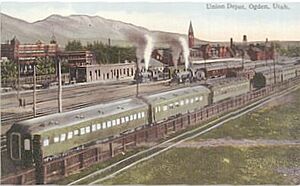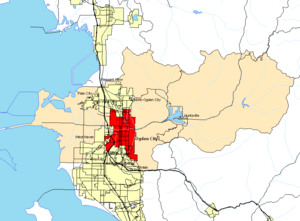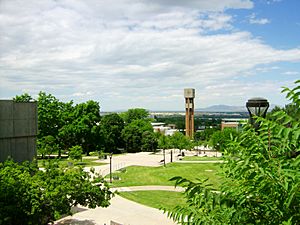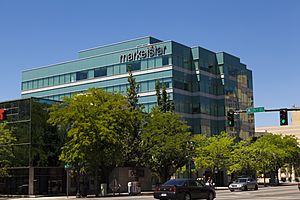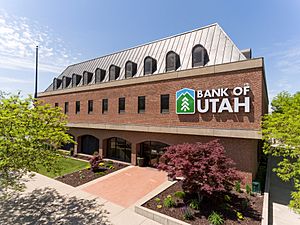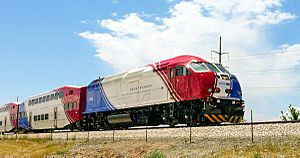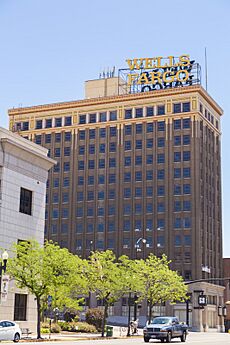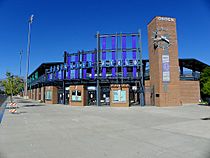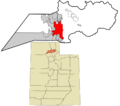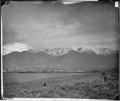Ogden, Utah facts for kids
Quick facts for kids
Ogden
|
||
|---|---|---|
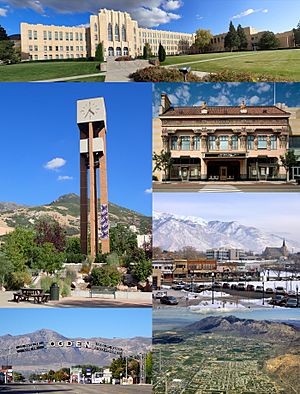
From top left to bottom right: Ogden High School, Weber State University Bell Tower, Peery's Egyptian Theater, Downtown, Gantry Sign, aerial view
|
||
|
||
| Nickname(s):
Junction City
|
||
| Motto(s):
Still Untamed
|
||
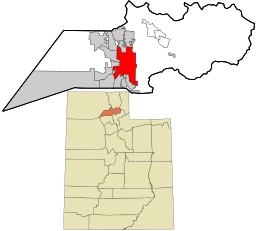
Location in Weber County and the state of Utah
|
||
| Country | United States | |
| State | Utah | |
| County | Weber | |
| Settled | 1844 | |
| Incorporated | February 6, 1851 (As Brownsville) | |
| Named for | Peter Skene Ogden | |
| Government | ||
| • Type | Council-Mayor | |
| Area | ||
| • City | 27.55 sq mi (71.35 km2) | |
| • Land | 27.55 sq mi (71.35 km2) | |
| • Water | 0.00 sq mi (0.01 km2) | |
| Elevation | 4,341 ft (1,323 m) | |
| Population
(2020)
|
||
| • City | 87,321 | |
| • Density | 3,169.55/sq mi (1,223.84/km2) | |
| • Urban | 608,857 (US: 69th) | |
| • Urban density | 2,863.9/sq mi (1,105.8/km2) | |
| • Metro | 694,863 (US: 83rd) | |
| Demonym(s) | Ogdenite | |
| Time zone | UTC−7 (MST) | |
| • Summer (DST) | UTC−6 (MDT) | |
| ZIP Codes |
84201, 84244, 844xx
|
|
| Area codes | 385, 801 | |
| FIPS code | 49-55980 | |
| GNIS feature ID | 2411305 | |
| Website | http://ogdencity.com/ | |
Ogden (pronounced OG-dən) is a city in Utah, United States. It is the main city of Weber County. Ogden is about 10 miles (16 km) east of the Great Salt Lake. It is also about 40 miles (64 km) north of Salt Lake City.
In 2020, Ogden had a population of 87,321 people. This makes it Utah's eighth largest city. For a long time, Ogden was a very important railway hub. It still handles a lot of train cargo today. This makes it a good place for manufacturing (making things) and commerce (buying and selling).
Ogden is also famous for its many old, historic buildings. It is close to the beautiful Wasatch Mountains. The city is also home to Weber State University. Ogden is a major city in the Ogden–Clearfield Metropolitan Area. This area includes several nearby counties. In 2010, Forbes magazine said the Ogden area was the 6th best place for families. Ogden has a special "sister city" relationship with Hof in Germany. This connection started in 1954.
Contents
- History of Ogden: From Fort to City
- Geography and Climate of Ogden
- People and Demographics in Ogden
- Education in Ogden
- Ogden's Economy and Businesses
- Transportation in Ogden
- Fun Places to Visit in Ogden
- Sports and Outdoor Fun in Ogden
- Ogden's Special Mentions
- Ogden in Movies and TV
- Famous People from Ogden
- Images for kids
- See also
History of Ogden: From Fort to City
Ogden was the first place in what is now Utah where people from Europe settled permanently. It was first called Fort Buenaventura. A trapper named Miles Goodyear started it in 1846. This was about a mile west of where downtown Ogden is now.
In 1847, Captain James Brown bought all the land that is now Weber County. He also bought some animals and Fort Buenaventura for $3,000. At that time, this area was part of Mexico. The settlement was then called Brownsville, named after Captain James Brown. Later, it was renamed Ogden. This new name honored Peter Skene Ogden. He was a leader for the Hudson's Bay Company. He had trapped animals in the Weber Valley many years before. Today, the original Fort Buenaventura site is a park.
Ogden is the closest big city to the Golden Spike location. This is at Promontory Summit, Utah. Here, the First transcontinental railroad was finished in 1869. Ogden became a very important train junction. This was because it was on major east-west and north-south train routes. The local business group even had a motto: "You can't get anywhere without coming to Ogden."
Most train passengers traveling west to San Francisco from the eastern U.S. went through Ogden. They did not go through the larger Salt Lake City to the south. Today, the national passenger train system, Amtrak, no longer stops directly in Ogden. People who want to travel by train to or from Ogden must use the FrontRunner commuter rail. This train takes them to Salt Lake City and Provo.
In 1972, The Church of Jesus Christ of Latter-day Saints built the Ogden Utah Temple. This temple was built to serve the many LDS people in the area. In 2010, the Church announced plans to update the Ogden Temple. The work started in 2011. It included changing the outside of the temple. They also removed the steeple from the nearby Tabernacle. This made the Temple's steeple the main focus. A new underground parking garage and gardens were also added. The Temple was opened again in 2014.
Ogden used to be Utah's second-largest city. Because of this, it has many historic buildings. However, by the 1980s, some suburbs of Salt Lake City and Provo grew larger than Ogden.
The Defense Depot Ogden Utah was a military base in Ogden. It operated from 1941 to 1997. Part of its land is now a business park. It is called the Business Depot Ogden, or "BDO" for short.
Geography and Climate of Ogden
Ogden's Location and Landscape
Ogden is located at the base of the Wasatch Mountains. The city covers about 26.6 square miles (71.35 km²), all of it land. The height of the city above sea level ranges from about 4,300 to 5,000 feet (1,310 to 1,524 meters).
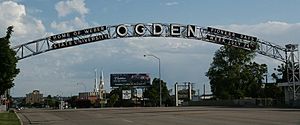
The Ogden and Weber Rivers flow through the city. They start in the mountains to the east. They meet just west of the city limits. Pineview Dam is in the Ogden River Canyon. This is about 7 miles (11 km) east of Ogden. The water held by the dam creates a reservoir. This reservoir provides water and a place for water sports.
Important mountains near Ogden include Mount Ogden to the east. Also, Ben Lomond is to the north.
How Ogden's Streets are Organized
Ogden has a grid system for its streets, like many U.S. cities. Its neighboring towns are South Ogden, Roy, West Haven, Marriott-Slaterville, Farr West, Pleasant View, and North Ogden. Streets are numbered from north to south. Directions like "E" for east and "W" for west are added to the numbers. This shows their location from the city center.
In the downtown area, near Union Station and 25th Street, cross streets are named after former U.S. presidents. Examples include Lincoln Avenue, Grant Avenue, Washington Boulevard, Adams Avenue, Jefferson Avenue, and Madison Avenue. Washington Boulevard is a main street that runs north and south. Harrison Boulevard is another central north-south street. The city is divided into six main areas. These include North End, West Ogden, Downtown, East Central, East Bench, and Shadow Valley.
Ogden's Weather Patterns
Ogden has hot and fairly dry summers. High temperatures often reach 95°F (35°C). Some days even reach 100°F (38°C). Rain in summer usually comes from thunderstorms. These happen between late July and mid-September. This is during the monsoon season.
The Pacific storm season is from October through May. Spring usually has the most rain. Snow often starts in late October or early November. The last snow usually falls in April.
| Climate data for Ogden, Utah, 1991–2020 normals, extremes 1897–present | |||||||||||||
|---|---|---|---|---|---|---|---|---|---|---|---|---|---|
| Month | Jan | Feb | Mar | Apr | May | Jun | Jul | Aug | Sep | Oct | Nov | Dec | Year |
| Record high °F (°C) | 62 (17) |
67 (19) |
79 (26) |
87 (31) |
98 (37) |
106 (41) |
106 (41) |
104 (40) |
104 (40) |
89 (32) |
76 (24) |
65 (18) |
106 (41) |
| Mean maximum °F (°C) | 48.4 (9.1) |
56.6 (13.7) |
69.7 (20.9) |
77.8 (25.4) |
87.6 (30.9) |
96.2 (35.7) |
100.3 (37.9) |
97.4 (36.3) |
91.0 (32.8) |
79.4 (26.3) |
66.0 (18.9) |
53.1 (11.7) |
100.6 (38.1) |
| Mean daily maximum °F (°C) | 35.7 (2.1) |
41.9 (5.5) |
52.7 (11.5) |
59.6 (15.3) |
70.1 (21.2) |
81.5 (27.5) |
91.3 (32.9) |
88.7 (31.5) |
77.8 (25.4) |
62.7 (17.1) |
48.5 (9.2) |
36.8 (2.7) |
62.3 (16.8) |
| Daily mean °F (°C) | 28.5 (−1.9) |
33.4 (0.8) |
42.9 (6.1) |
49.1 (9.5) |
58.6 (14.8) |
68.4 (20.2) |
78.0 (25.6) |
75.8 (24.3) |
65.4 (18.6) |
51.7 (10.9) |
39.5 (4.2) |
29.6 (−1.3) |
51.7 (11.0) |
| Mean daily minimum °F (°C) | 21.2 (−6.0) |
24.9 (−3.9) |
33.1 (0.6) |
38.6 (3.7) |
47.1 (8.4) |
55.3 (12.9) |
64.8 (18.2) |
62.9 (17.2) |
53.0 (11.7) |
40.8 (4.9) |
30.5 (−0.8) |
22.4 (−5.3) |
41.2 (5.1) |
| Mean minimum °F (°C) | 7.1 (−13.8) |
10.9 (−11.7) |
21.1 (−6.1) |
27.2 (−2.7) |
33.8 (1.0) |
42.5 (5.8) |
55.8 (13.2) |
52.3 (11.3) |
39.7 (4.3) |
27.6 (−2.4) |
17.3 (−8.2) |
8.3 (−13.2) |
3.6 (−15.8) |
| Record low °F (°C) | −23 (−31) |
−23 (−31) |
5 (−15) |
6 (−14) |
26 (−3) |
29 (−2) |
36 (2) |
33 (1) |
20 (−7) |
8 (−13) |
0 (−18) |
−20 (−29) |
−23 (−31) |
| Average precipitation inches (mm) | 1.53 (39) |
1.55 (39) |
1.71 (43) |
1.97 (50) |
2.17 (55) |
1.12 (28) |
0.35 (8.9) |
0.72 (18) |
1.06 (27) |
1.68 (43) |
1.17 (30) |
1.33 (34) |
16.36 (414.9) |
| Average snowfall inches (cm) | 13.8 (35) |
11.0 (28) |
5.8 (15) |
2.3 (5.8) |
0.0 (0.0) |
0.0 (0.0) |
0.0 (0.0) |
0.0 (0.0) |
0.0 (0.0) |
0.3 (0.76) |
5.7 (14) |
14.7 (37) |
53.6 (135.56) |
| Average precipitation days (≥ 0.01 in) | 8.8 | 8.6 | 9.1 | 9.9 | 8.9 | 4.8 | 3.0 | 3.9 | 5.5 | 6.7 | 7.3 | 9.4 | 85.9 |
| Source 1: NOAA | |||||||||||||
| Source 2: XMACIS2 | |||||||||||||
People and Demographics in Ogden
| Historical population | |||
|---|---|---|---|
| Census | Pop. | %± | |
| 1850 | 500 | — | |
| 1860 | 1,464 | 192.8% | |
| 1870 | 3,127 | 113.6% | |
| 1880 | 6,069 | 94.1% | |
| 1890 | 14,889 | 145.3% | |
| 1900 | 16,313 | 9.6% | |
| 1910 | 25,580 | 56.8% | |
| 1920 | 32,804 | 28.2% | |
| 1930 | 40,272 | 22.8% | |
| 1940 | 43,688 | 8.5% | |
| 1950 | 57,112 | 30.7% | |
| 1960 | 70,197 | 22.9% | |
| 1970 | 69,478 | −1.0% | |
| 1980 | 64,407 | −7.3% | |
| 1990 | 63,909 | −0.8% | |
| 2000 | 77,226 | 20.8% | |
| 2010 | 82,825 | 7.3% | |
| 2020 | 87,321 | 5.4% | |
| source: | |||
Ogden's Population in 2020
In 2020, Ogden had 87,321 people. The city is home to a diverse group of people.
| Race / Ethnicity (NH = Non-Hispanic) | Pop 2000 | Pop 2010 | Pop 2020 | % 2000 | % 2010 | % 2020 |
|---|---|---|---|---|---|---|
| White alone (NH) | 54,216 | 52,557 | 52,743 | 70.20% | 63.46% | 60.40% |
| Black or African American alone (NH) | 1,630 | 1,553 | 1,759 | 2.11% | 1.88% | 2.01% |
| Native American or Alaska Native alone (NH) | 681 | 701 | 696 | 0.88% | 0.85% | 0.80% |
| Asian alone (NH) | 1,023 | 966 | 1,197 | 1.32% | 1.17% | 1.37% |
| Pacific Islander alone (NH) | 109 | 241 | 331 | 0.14% | 0.29% | 0.38% |
| Other race alone (NH) | 69 | 150 | 404 | 0.09% | 0.18% | 0.46% |
| Mixed race or Multiracial (NH) | 1,245 | 1,717 | 3,293 | 1.61% | 2.07% | 3.77% |
| Hispanic or Latino (any race) | 18,253 | 24,940 | 26,898 | 23.64% | 30.11% | 30.80% |
| Total | 77,226 | 82,825 | 87,321 | 100.00% | 100.00% | 100.00% |
Ogden's Ancestry Groups
In 2017, the largest ancestry groups in Ogden were:
- English (15.3%)
- German (9.8%)
- American (6.7%)
- Irish (6.6%)
- Scottish (3.7%)
- Italian (3.4%)
- Danish (2.9%)
- French (2.1%)
- Swedish (1.9%)
- Welsh (1.7%)
Education in Ogden
Schools for Kids (K-12)
The Ogden City School District runs the public schools in the city. Its boundaries are the same as the city limits. It includes Ogden High School and Ben Lomond High School.
The Weber School District serves areas outside of Ogden city limits. This is true even if they have an "Ogden, Utah" mailing address.
DaVinci Academy of Science and the Arts is a charter school system. It has both elementary and secondary schools.
The Utah Schools for the Deaf and the Blind has a boarding facility in Ogden.
The Roman Catholic Diocese of Salt Lake City also runs Catholic schools here. This includes Saint Joseph Catholic High School.
Colleges and Universities
Ogden is home to several higher education institutions:
- Weber State University
- Ogden-Weber Applied Technology College
- Stevens–Henager College
The Ogden Botanical Gardens are also in Ogden. They are a branch of Utah State University. They offer classes and distance learning programs.
Ogden's Economy and Businesses
Ogden is a main city in Utah's second largest MSA. This means it is an important business center for northern Utah. Many government offices are located in the central part of the city. These include federal, state, county, and city government buildings.
The Internal Revenue Service (IRS) has a big office in Ogden. It is the city's largest employer, with over 5,000 workers. Other big employers include McKay Dee Hospital and Weber State University. Also, the Ogden City School District, Autoliv, Fresenius, and Convergys employ many people.
In 2013, Forbes magazine ranked Ogden highly. It was number 16 on their list of the Best Places for Business and Careers.
The western parts of Ogden have several industrial areas. The biggest one is Business Depot Ogden. This used to be an Army depot. Now, it is a large business park covering over 1,000 acres.
Companies Headquartered in Ogden
Several companies have their main offices in Ogden:
- MarketStar – A company focused on sales and marketing.
- ENVE Composites – Makes high-quality bicycle parts.
- Autoliv North America – Produces safety equipment for cars.
- Bank of Utah – Provides banking services.
- America First Credit Union – Offers banking services.
- Kadince – A company that provides software services.
Transportation in Ogden
Major highways like I-15 and I-84 serve Ogden. I-84 goes east-west through the southern parts of the city. It joins I-15 near Riverdale. I-15 runs north-south along the western edge of the city. It connects Ogden to other parts of the Wasatch Front and beyond.
US-89 enters Ogden from the south. It runs through the city as Washington Boulevard, which is Ogden's main street. It then continues north to Brigham City. State Route 39 goes east-west through the city as 12th Street. It continues east through Ogden Canyon. This road leads to Pineview Reservoir and the mountain town of Huntsville.
The Utah Transit Authority (UTA) operates many bus routes. Four routes go directly between Salt Lake City and Ogden. Many others serve Weber and northern Davis counties. These buses connect to the Ogden Intermodal Hub or Weber State University. Ogden is also where two bus routes to Brigham City start. This is the northernmost part of UTA's bus system. There is also a Greyhound bus stop in Ogden.
The FrontRunner commuter rail runs between Salt Lake City and the Ogden Intermodal Hub.
Ogden–Hinckley Airport is in the southwest part of the city. It is Utah's busiest airport for smaller planes. Currently, Breeze Airways offers flights to Orange County, California.
Fun Places to Visit in Ogden
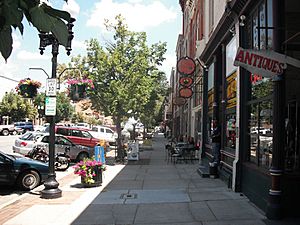
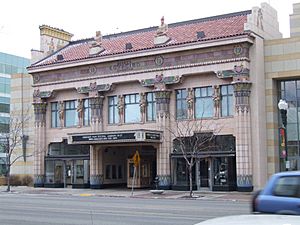
Ogden has many interesting places to see:
- Bigelow-Ben Lomond Hotel
- Dee Events Center
- Eccles Avenue Historic District
- Historic 25th Street
- The Ice Sheet: This was used for Curling during the 2002 Winter Olympics.
- Jefferson Avenue Historic District
- The Junction: A place with shops and homes.
- Ogden High School
- Ogden Nature Center
- Ogden Utah Temple
- American Can Company of Utah Building Complex
- Ott Planetarium
- Peery's Egyptian Theatre
- Snowbasin Ski Area: Used for alpine skiing during the 2002 Winter Olympics.
- Union Station
- Ogden Forest Service Building
- Weber State University
Sports and Outdoor Fun in Ogden
The mountains and rivers near Ogden offer many chances for outdoor activities.
There is a large system of trails right next to the city. These trails give people easy access to the foothills of the Wasatch Range. People use these trails for hiking, running, and mountain biking. In winter, they are sometimes used for snowshoeing and cross-country skiing. Steeper trails go up into the mountains. Many other mountain trails start close to the city. There are also paved trails along the Ogden and Weber Rivers.
The rocky cliffs above Ogden's foothills are great for rock climbing. A large area of boulders in the foothills is a popular spot for bouldering.
East of Ogden, there are three downhill ski areas: Snowbasin, Powder Mountain, and Nordic Valley. Popular places for cross-country skiing include Snowbasin and Weber County's North Fork Park.
Kayaking is a popular sport on parts of the Ogden and Weber Rivers. There is a special kayak park on the Weber River in the western part of the city. The reservoirs near Ogden are used for many different water sports.
Ogden is also home to several sports teams:
- The Ogden Raptors: A minor league baseball team in the Pioneer League.
- The Junction City Roller Dolls: A Women's Flat Track Derby Association league.
- The Ogden Mustangs: A junior hockey team in the United States Premier Hockey League.
Ogden Stadium hosts the annual "Hot Rocking 4th." This is a motorsports event. There are also several golf courses in Ogden.
Weber State University has many college sports teams. These teams attract fans from the city. The university is especially known for its basketball team.
Ogden is a satellite location for the Sundance Film Festival. A local film festival, now called the Foursite Film Festival, has been held every year since 2004. Other fun events include a downtown farmer's market, the Ogden Arts Festival, the Harvest Moon Festival, Ogden Winterfest, and the Ogden Marathon.
Ogden has had two shopping malls. Newgate Mall was built in 1981. Ogden City Mall was built a year before. The Ogden City Mall was later taken down and replaced by The Junction complex.
Ogden's Special Mentions
Two ships in the United States Navy have been named after Ogden. The first was the USS Ogden (PF-39) in 1943. The second was the USS Ogden (LPD-5) in 1964.
On September 17, 2024, the National Park Service announced that Ogden was named a World War II Heritage City.
Ogden in Movies and TV
Ogden is one of five cities shown in the first season of the ABC show Emergency Call. This show features real 9-1-1 calls and the people who answer them. The old Ogden City Mall was featured in the music video for the pop song "I Think We're Alone Now" by Tiffany Darwish.
Famous People from Ogden
Many notable people have connections to Ogden:
- Hal Ashby, a film director who won an Academy Award.
- Rodney Bagley, who helped invent the catalytic converter.
- John Moses Browning, a famous inventor of firearms.
- Nolan Bushnell, who founded Atari and Chuck E. Cheese's.
- Tom Chambers, a basketball player.
- Damian Lillard, a basketball player and NBA Rookie of the Year.
- J. Willard Marriott, who founded the Marriott hotel chain.
- Joe McQueen, a jazz saxophonist.
- Wataru Misaka, a basketball player.
- "The Osmonds": A famous family of entertainers, including Donny and Marie.
- Brent Scowcroft, a politician who was a United States National Security Advisor.
- Olene S. Walker, Utah's 15th Governor.
- Gedde Watanabe, an actor.
Images for kids
See also
 In Spanish: Ogden (Utah) para niños
In Spanish: Ogden (Utah) para niños
 | William Lucy |
 | Charles Hayes |
 | Cleveland Robinson |




